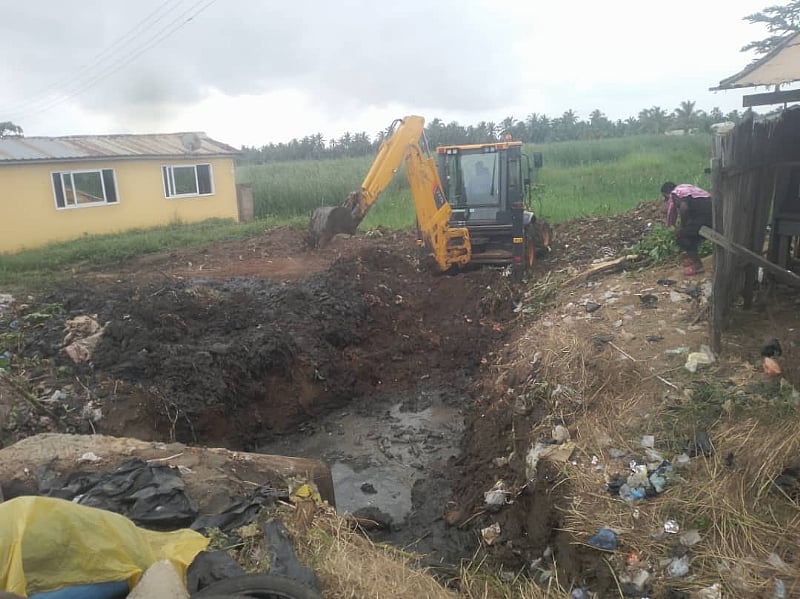The Ketu South Municipality in Ghana’s Volta Region, under the leadership of Municipal Chief Executive (MCE) Hon. Nicholas Kwabla Worclatsi, has embarked on a comprehensive de-silting project in Agbozume, a critical intervention aimed at mitigating the persistent threat of flooding. The initiative focuses on clearing the town’s drainage systems of accumulated sand, debris, and refuse, which have long posed a significant risk to residences and businesses located along the waterways. The Dzanyigome stream, a vital artery near the Agbozume market, has been particularly affected by this environmental challenge, highlighting the urgency and importance of the MCE’s proactive measures. The de-silting exercise is not merely a reactive response to the immediate flood risk but forms part of a broader vision to transform Ketu South into one of the cleanest municipalities in the country, signaling a long-term commitment to environmental sustainability and public health.
Recognizing that maintaining a clean environment requires ongoing effort, Hon. Worclatsi has championed the institution of a weekly sanitation day, a community-wide initiative designed to instill a culture of cleanliness and shared responsibility. This regular engagement will ensure the continued effectiveness of the de-silting project and prevent the re-accumulation of debris in the drainage systems. Furthermore, the MCE plans to introduce and enforce bylaws to regulate waste disposal and communal labor, providing a legal framework to underpin the municipality’s sanitation drive. These bylaws will establish clear guidelines for waste management and encourage active community participation, with sanctions in place for non-compliance to ensure the effectiveness of the regulations.
Complementing the de-silting project and the sanitation drive, Hon. Worclatsi has also unveiled plans to attract investment to the municipality, demonstrating a multi-faceted approach to development that addresses both immediate needs and long-term economic growth. Specifically, the MCE has announced the imminent arrival of investors who are expected to drain the local lagoon within two weeks. This ambitious project holds significant economic potential for the community as it will pave the way for residents to engage in fishing farming, providing new livelihood opportunities and boosting the local economy. The lagoon drainage project, coupled with the improved sanitation, promises to transform Agbozume into a more vibrant and prosperous community.
The residents of Agbozume have warmly embraced the MCE’s initiatives, expressing their gratitude for his proactive leadership and dedication to addressing the pressing issue of flooding. They recognize the significant positive impact that these projects will have on their lives, both in terms of mitigating the immediate threat of flooding and in creating long-term economic opportunities. The community’s enthusiastic support underscores the importance of engaging local stakeholders in development initiatives, ensuring that projects are aligned with community needs and priorities. This collaborative approach fosters a sense of ownership and shared responsibility, contributing to the long-term success and sustainability of the projects.
Hon. Worclatsi, emphasizing the crucial role of community participation, has called upon all residents to actively engage in maintaining the cleanliness of the municipality. He has stressed that the success of these initiatives hinges on the collective effort of the entire community, highlighting the importance of individual responsibility in achieving shared goals. By promoting a culture of shared responsibility, the MCE aims to create a sustainable and resilient community that is actively involved in its own development. The combination of proactive leadership and community engagement is crucial for addressing the complex challenges facing Agbozume and building a brighter future for its residents.
In conclusion, the MCE’s multifaceted approach to development, encompassing de-silting, sanitation drives, investment attraction, and community engagement, demonstrates a comprehensive vision for the future of Ketu South Municipality. The de-silting project tackles the immediate threat of flooding while laying the foundation for a cleaner and healthier environment. The introduction of bylaws and the emphasis on communal labor establish a framework for sustainable waste management practices. The lagoon drainage project promises to unlock significant economic opportunities through fishing farming, boosting the local economy and improving livelihoods. Underlying all these initiatives is the recognition of the importance of community participation, fostering a sense of shared responsibility and ensuring the long-term success of the MCE’s vision for a cleaner, safer, and more prosperous Ketu South.














